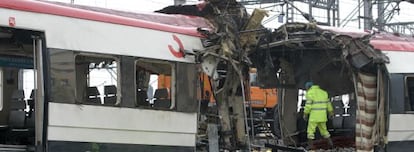Attorney general orders inquiry into wreckage from Madrid train bombings
Metal gutted from a bombed commuter car may still be stored in a warehouse

Reawakening conspiracy allegations fostered by some in the governing Popular Party (PP), Attorney General Eduardo Torres Dulce announced on Friday that he was ordering investigators to look at wreckage from one of the commuter trains bombed during the March 11, 2004 terrorist attacks in Madrid and recently found stored away in a train yard.
Torres Dulce said that he took the initiative because he wants to be sure there was no obstruction of justice committed by someone who may have kept the rail car wreckage hidden during the exhaustive inquiry.
The metal scraps were found in a train yard in Madrid’s Villaverde district owned by Tafesa, a maintenance firm contracted by Renfe Spanish rail system, and is said to come from the train that was attacked at the Santa Eugenia station. Tafesa was in charge of taking away the damaged rail cars following the tragedy. In an earlier ruling, the Supreme Court had given Renfe the right to dispose of the train cars after all of the expert and forensic evidence was taken.
The attorney general said he was acting on information from the conservative website Libertad Digital, which posted a report Friday alleging that all of the rail cars except one were immediately gutted and scrapped after Tafesa took charge of them. The surviving car, the focal point where the bomb went off at the Santa Eugenia station, according to Libertad Digital, was gutted and completely repaired. But the wreckage from inside the train was put away inside a warehouse where the website claims it remains today. Torres Dulce has asked Madrid district attorney Eduardo Esteban to take a look at the metal debris.
The attorney general’s announcement comes just nine days ahead of the eighth anniversary of the Madrid train bombings in which 191 people died and more than 1,800 were injured in the worst terrorist attack on Spanish soil. It was welcomed by the president of the Victims of Terrorism Association (AVT) Angeles Pedraza.
“I want to make it clear that our aim is not to blame anyone else in the attack but we need to rule out all possibilities, and everyone who was involved should have to pay for what happened that day,” Pedraza said.
Conservative sectors, including some in the ruling PP, have long believed in a conspiracy theory, originally pushed by El Mundo newspaper, that ETA — not Islamic extremists — was behind the attack.
The PP has alleged that the some investigators linked to the Socialists allegedly covered up evidence pointing to ETA, which helped the party win the general elections three days later by drumming up anti-Iraq war sentiment. After José Luis Rodríguez won in 2004 he immediately pulled Spanish troops from Iraq, where they had been sent by his predecessor José María Aznar of the PP to participate with the US-backed coalition.
While a High Court determined in 2007 that the terrorist attacks were perpetrated by jihadists, Madrid Court Judge Coro Cillán led a three-year inquiry to determine whether Juan Jesús Sánchez Manzano, chief of the from the special explosives unit Tedax, and a forensic expert, had deliberately destroyed evidence taken from the trains. The complaint against the Tedax head was filed by several rightwing groups but the case was dropped early last month after Cillán’s judiciary superiors said there was no basis for her to continue investigating the allegations.
Now Manos Limpias, the obscure rightwing union which tried to get Judge Baltasar Garzón punished for opening a criminal inquiry into human rights abuses committed during the Francisco Franco regime, has also filed a complaint with Cillán concerning the newly found train car.
During his meeting with reporters, Attorney General Torres Dulce said that he didn’t agree with the Madrid provincial court panel’s decision to drop the case against Sánchez Manzano, but added that he won't appeal it.
Tu suscripción se está usando en otro dispositivo
¿Quieres añadir otro usuario a tu suscripción?
Si continúas leyendo en este dispositivo, no se podrá leer en el otro.
FlechaTu suscripción se está usando en otro dispositivo y solo puedes acceder a EL PAÍS desde un dispositivo a la vez.
Si quieres compartir tu cuenta, cambia tu suscripción a la modalidad Premium, así podrás añadir otro usuario. Cada uno accederá con su propia cuenta de email, lo que os permitirá personalizar vuestra experiencia en EL PAÍS.
¿Tienes una suscripción de empresa? Accede aquí para contratar más cuentas.
En el caso de no saber quién está usando tu cuenta, te recomendamos cambiar tu contraseña aquí.
Si decides continuar compartiendo tu cuenta, este mensaje se mostrará en tu dispositivo y en el de la otra persona que está usando tu cuenta de forma indefinida, afectando a tu experiencia de lectura. Puedes consultar aquí los términos y condiciones de la suscripción digital.








































